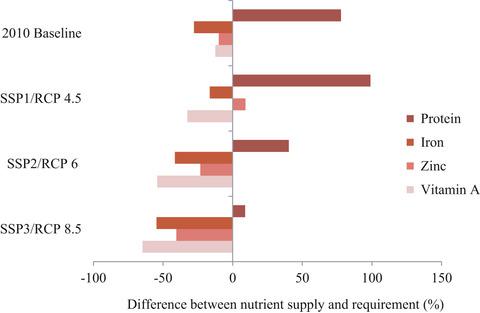当前位置:
X-MOL 学术
›
Food Energy Secur.
›
论文详情
Our official English website, www.x-mol.net, welcomes your feedback! (Note: you will need to create a separate account there.)
The impact of climate and societal change on food and nutrition security: A case study of Malawi
Food and Energy Security ( IF 5 ) Pub Date : 2021-05-04 , DOI: 10.1002/fes3.290 Charlotte Hall 1 , Jennie I. Macdiarmid 2 , Pete Smith 3 , Terrence P. Dawson 4
Food and Energy Security ( IF 5 ) Pub Date : 2021-05-04 , DOI: 10.1002/fes3.290 Charlotte Hall 1 , Jennie I. Macdiarmid 2 , Pete Smith 3 , Terrence P. Dawson 4
Affiliation

|
Society is currently facing an unprecedented challenge in terms of achieving food and nutrition security for a rapidly expanding global population while also minimising and reversing damage to the natural environment. Compounding this issue is climate change, which adversely affects the four pillars of food security: availability, access, utilisation and stability. This study aims to quantify the potential impact of future climate and societal change on food and nutrition security under a range of plausible scenarios. Malawi is used as a case study given it is one of the most food insecure countries in the world. Using the Food Estimation and Export for Diet and Malnutrition Evaluation modelling framework, the quantity and quality of the national food supply are assessed under a suite of future (2050) climate and socioeconomic scenarios. The results indicate that undernourishment prevalence could be reduced in Malawi under a best-case scenario; however, undernourishment is likely to increase assuming either a business-asusual or a pessimistic scenario. On the other hand, the quality of the food supply in Malawi (in terms of micronutrient provision) is likely to decrease even under a best-case scenario. Moreover, projected dietary change in the form of nutrition transition in Malawi is unlikely to improve micronutrient provision sufficiently to meet requirements. This is a consequence of the already low supply of micronutrient dense foods in Malawi, the negative impact of climate change on micronutrient dense crops and an insufficient increase in micronutrient dense foods associated with nutrition transition. This study highlights the importance of moving beyond the focus on dietary energy supply as a measure of food security since nutrient adequacy of diets may be a more pressing issue in the future than simply the quantity of food and supply of energy.
中文翻译:

气候和社会变化对粮食和营养安全的影响:以马拉维为例
在为快速增长的全球人口实现粮食和营养安全,同时最大限度地减少和扭转对自然环境的破坏方面,社会目前面临着前所未有的挑战。使这个问题更加复杂的是气候变化,它对粮食安全的四大支柱产生了不利影响:供应、获取、利用和稳定性。本研究旨在量化未来气候和社会变化在一系列合理情景下对粮食和营养安全的潜在影响。马拉维被用作案例研究,因为它是世界上粮食最不安全的国家之一。使用用于饮食和营养不良评估的粮食估计和出口模型框架,在一套未来(2050 年)气候和社会经济情景下评估国家粮食供应的数量和质量。结果表明,在最好的情况下,马拉维的食物不足发生率可以降低;然而,假设一切正常或悲观的情况,营养不足可能会增加。另一方面,即使在最好的情况下,马拉维的食品供应质量(在微量营养素供应方面)也可能会下降。此外,马拉维以营养转变形式预测的膳食变化不太可能充分改善微量营养素供应以满足需求。这是由于马拉维微量营养素密集型食品供应量已经很低、气候变化对微量营养素密集型作物的负面影响以及与营养转型相关的微量营养素密集型食品增加不足造成的结果。
更新日期:2021-05-04
中文翻译:

气候和社会变化对粮食和营养安全的影响:以马拉维为例
在为快速增长的全球人口实现粮食和营养安全,同时最大限度地减少和扭转对自然环境的破坏方面,社会目前面临着前所未有的挑战。使这个问题更加复杂的是气候变化,它对粮食安全的四大支柱产生了不利影响:供应、获取、利用和稳定性。本研究旨在量化未来气候和社会变化在一系列合理情景下对粮食和营养安全的潜在影响。马拉维被用作案例研究,因为它是世界上粮食最不安全的国家之一。使用用于饮食和营养不良评估的粮食估计和出口模型框架,在一套未来(2050 年)气候和社会经济情景下评估国家粮食供应的数量和质量。结果表明,在最好的情况下,马拉维的食物不足发生率可以降低;然而,假设一切正常或悲观的情况,营养不足可能会增加。另一方面,即使在最好的情况下,马拉维的食品供应质量(在微量营养素供应方面)也可能会下降。此外,马拉维以营养转变形式预测的膳食变化不太可能充分改善微量营养素供应以满足需求。这是由于马拉维微量营养素密集型食品供应量已经很低、气候变化对微量营养素密集型作物的负面影响以及与营养转型相关的微量营养素密集型食品增加不足造成的结果。

























 京公网安备 11010802027423号
京公网安备 11010802027423号